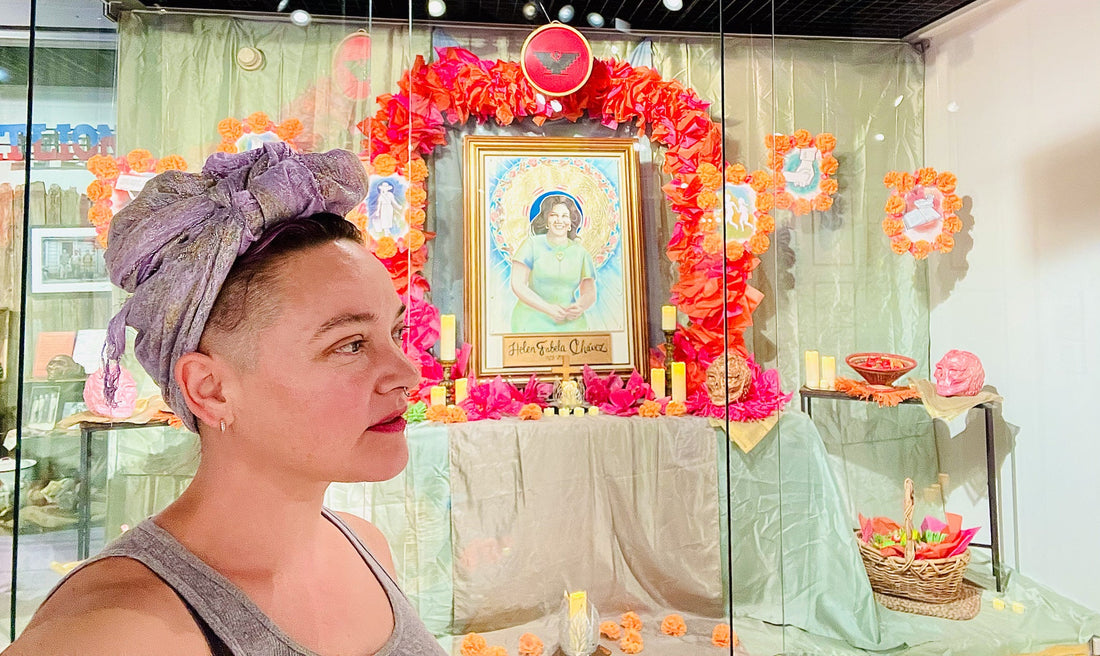
Why I Chose Helen Fabela Chávez for My Día de los Muertos Altar - Donate to the UFW
Share
I am honored to create a Día de los Muertos altar at the California Museum, dedicated to a woman who has inspired me deeply: Helen Fabela Chávez.
Special Event at the California Museum, 1020 O St.
Sacramento, CA 95814 - Saturday, October 12, 2024, from 6:00 PM to 10:00 PM, and my work will be displayed from October 12 through November 17, 2024.

Helen’s work, often behind the scenes, played a pivotal role in shaping the labor movement in California and the fight for farm workers' rights. Yet, much of her contribution was unrecognized for years, much like the countless women whose quiet labor sustains our communities every day. Much of what I have learned, to do my best to honor her memory, was done online, reading what I could and organizing the lengthy and amazing things she accomplished. Honestly, I wish I had more time to work on this altar. I would sculpt and paint and draw so many things for her.
Before I move on, let's take this moment to honor her memory. Please consider donating whatever you can to the United Farm Workers (UFW). And if you cannot donate, then please follow them and share their work.
CLICK/TAP HERE TO DONATE
The "Huelga Bird" - Symbol of The United Farm Workers

Helen Fabela Chávez: A Life of Quiet Revolution
Helen Fabela Chávez wasn’t always in the public eye, but she was a revolutionary in her own right. As the wife of César Chávez, she worked behind the scenes to build the United Farm Workers (UFW) movement from the ground up. Often, her contributions were overshadowed by her husband’s more visible and incredible role. I remember learning about him in school, his hunger strikes, the upheaval, and the speeches calling for peaceful protest. But without her unwavering support, both emotional and logistical, the labor movement may never have reached the heights it did. Several sources mention how tired César would get, but after speaking with Helen, the next day he was ready to fight for the movement.
While César Chávez became the face of the movement, Helen was organizing, planning, and caring for their family in the background. I never knew this until much later, as I followed the work of Union Activists like the incredible Dolores Huerta, who not only speaks on what needs to be done know, but what has already been done and not forgotten.
After more research, I learned that Helen was instrumental in the day-to-day running of the movement, working long hours in the UFW’s credit union, ensuring the survival of countless farmworker families.
Her work wasn't glamorous. It wasn’t celebrated. But it was crucial. Like so many women throughout history, Helen quietly sustained a movement that changed the lives of so many.

Women Behind the Scenes: The Pillars of Society
Helen’s story is a powerful reminder of how often women’s work goes unrecognized. Throughout history, women have been the invisible hands that build civilizations. They raise and educate the next generation, feed families, and sustain entire communities. Whether it's in homes, schools, or fields, women have shaped our world in ways that often go unnoticed.
It’s a pattern we see again and again: women working behind the scenes, supporting revolutions, and maintaining the fabric of society. Helen Fabela Chávez reminds me of this, someone whose contributions were largely unrecognized until much later in her life. In choosing to honor her on my Día de los Muertos altar, I aim to bring what I learned to the forefront.
Helen’s Role in Supporting Children of the Movement
Helen Fabela Chávez not only raised her own children while supporting the farmworker movement, but she also helped care for the children of farmworkers. Helen recognized that many farmworkers couldn’t participate in strikes or attend meetings due to a lack of childcare. To address this, she would take care of the children of other UFW leaders and organizers while their parents fought for justice. Her home became a sanctuary, not just for her own children, but for many others in the movement. The monumental importance of creating a safe space for children is unmeasurable.
Education and Advocacy for Children
Helen was a strong advocate for the children of farmworkers, many of whom were working in the fields instead of going to school. She believed that education was key to breaking the cycle of poverty and exploitation. She, along with the UFW, called for better access to schooling for farmworker families and pushed for the enforcement of child labor laws.
Creating a Family-Centered Movement
Helen’s own family became a model of what the movement was fighting for: dignity and security for future generations. She worked to ensure that farmworker children were not forgotten in the fight for labor rights, helping to provide for their well being so that their parents could focus on the larger goals of the movement. Here, someone might use the word "tirelessly" because from the outside it would seem so. But women who do so much are often given that title, "tireless". I will not. I did not know her, but I will assume it was exhausting. Maybe instead I could write, "relentlessly hopeful" or "she persevered". Someone called her a "lioness" and I think I like that best.
Sustaining the Movement’s Daily Operations:
I hadn't known that Helen was often the logistical backbone of the UFW. While César and other leaders were out organizing and speaking, Helen was managing the daily operations like answering phones, organizing events, and coordinating volunteers. This kind of work ensures that the movements can continue, especially during the most challenging times.
UFW Credit Union
Helen worked as the manager of the UFW’s credit union. I find this incredible: to provide financial support to farmworkers. She helped families manage their finances, providing loans for essential needs like housing, healthcare, and food during times of economic hardship. This credit union was vital in sustaining the movement during long strikes and boycotts, when many families had little or no income.
Strikes and Boycotts:
Helen was deeply involved in organizing some of the most important strikes and boycotts, including the Delano Grape Strike and the nationwide boycott of California grapes. While César Chávez fasted during the 1968 strike, Helen was by his side, providing support and acting as a link between him and the farmworkers he was fighting for.

Recognition Later in Life:
Despite the monumental impact of her work, Helen remained largely unrecognized for many years. In 1994 she received national recognition when President Bill Clinton awarded her the "Presidential Medal of Freedom" on behalf of her late husband, César Chávez. I believe it was during this time when her own contributions finally came to light into the broader public eye, and people began to understand the full scope of her work for farmworker families, children, and the movement as a whole.
Why Supporting the United Farm Workers Matters
Helen’s legacy lives on in the work of the UFW, which continues to fight for the rights and dignity of farmworkers across the United States. Farmworkers are some of the most vulnerable members of our society, often working in grueling conditions for minimal pay. The UFW provides crucial support, ensuring that workers have access to better wages, safer working conditions, and legal representation.
As we honor Helen Fabela Chávez, it’s important to also support the ongoing work of the UFW. The movement she helped to build remains as relevant today as it was during her time. By donating to the UFW, you can directly support farmworkers and their families, continuing the fight that Helen and César Chávez started decades ago.
Honoring Helen and the Unsung Heroes Among Us
As I prepare this altar, I think not only of Helen but of the many women who, like her, have labored in the shadows. Women who raised children, worked long hours, and nurtured movements that changed the world. Helen’s story is one of quiet revolution, but her impact is immeasurable. She embodies the strength, and resilience that so many women possess. I also think of the little things, about her love of steak, of Santa Barbara, and of dancing, and about the bigger things, like the love that comes from the voices of those who speak on their memories of her.
I invite you to join me in honoring Helen Fabela Chávez a woman who built and sustained communities, protected and stood up for people, and cared for children and their families.

SOURCES:
Wikipedia - Helen Fabela Chavez
Cesar Chávez Education Toolkit
The Californian - Helen Fabela Chavez, wife of Cesar Chavez, dead at 88
Bella Online - Unsung Civil Rights Hero - Helen Fabela Chavez
United Farm Workers - Helen Fabela Chavez
Clean Water - Remémbrense — In Memory of Helen Fabela Chavez, 1928 to 2016
Latinitas Magazine - Helen Chávez the Heroine of Speaking Up
Farmworkermovement-csun.org - Helen Fabela Chavez
NBC News - Quiet But Fierce: Farmworker Activist Helen Chavez Remembered






1 comment
Beautiful description of Helan Chavez and her impact on all of us.
MNC Inspiring success agency is grateful for your work too!